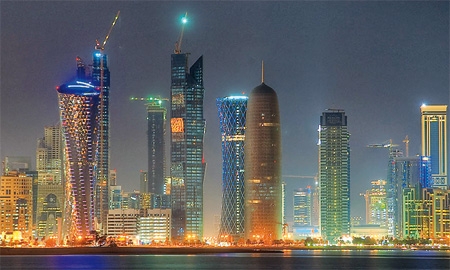The government’s prompt intervention in supporting local banks in December 2009, the solid levels of liquidity, and the state’s sound pre-recession economy have been major factors in safeguarding Qatar. The country achieved a remarkable growth in GDP of over 16% last year and the forecast for 2011 is 18%.
In the financial sector, recent developments include changes at Qatar Financial Center (QFC) aimed at further boosting the finance sector’s contribution to economic diversification.
Another boom to the sector is the partnership between the Qatar Exchange (QE) and the NYSE’s Euronext, whose 20% stake ($200 million) represents its largest investment in a foreign exchange and first step into the Middle East. The government has unified the regulation of its financial services sector under a single body, creating a clearer framework for foreign operators.
Doha Bank is the largest private commercial bank in Qatar, and after being incorporated in 1978 it has grown to be one of the country’s leading financial services institutions. The lender strives to offer its clients the most innovative technologies and to employ well-trained, experienced workers.
“Doha Bank indeed is the leader, the one to initiate exclusive offerings, mainly alternative investment options for its loyal and yet financially established customers,” says Raghavan Seetharaman, chief executive officer of Doha Bank Group.
QATAR ACHIEVED NOTABLE GDP GROWTH OF MORE THAN 16% LAST YEAR AND 18% IS FORECAST FOR 2011
WORKING WITH THE COUNTRY FOR OVER 30 YEARS, CITIBANK OFFERS WEALTHY QATARI CITIZENS SOPHISTICATED BANKING PRODUCTS
QATAR HAS FOUR ISLAMIC BANKS AND 14 CONVENTIONAL BANKS: SIX DOMESTIC, ONE SPECIALIZED AND SEVEN FOREIGN-OWNED INSQATAR ACHIEVED NOTABLE GDP GROWTH OF MORE THAN 16% LAST YEAR AND 18% IS FORECAST FOR 2011
WORKING WITH THE COUNTRY FOR OVER 30 YEARS, CITIBANK OFFERS WEALTHY QATARI CITIZENS SOPHISTICATED BANKING PRODUCTS
QATAR HAS FOUR ISLAMIC BANKS AND 14 CONVENTIONAL BANKS: SIX DOMESTIC, ONE SPECIALIZED AND SEVEN FOREIGN-OWNED INSTITUTIONS |
Qatar is making an ambitious effort to attract more foreign banks. In 2005 the government set up the Qatar Financial Center (QFC) as part of its plan to become a regional banking hub. The QFC helps give Qatari and international investors access to local and regional opportunities.
U.S.-based lender Citibank has been developing strong relationships with Qatar’s financial institutions and top corporations for more than 30 years from its regional headquarters in Bahrain, Dubai and London. In 2007, however, the bank set up a full-service presence at the QFC, from which it offers more personal contact in its full range of corporate and investment banking services.
Earlier this year Citi announced plans to strengthen its operations in the emirate, which has enjoyed rapid economic growth and whose wealthy citizens have need for more sophisticated bank products.
“Qatar is uniquely positioned with the amount of liquidity to tap opportunities,” says Alberto Verme, Citi’s chief executive for Europe, the Middle East and Africa.
Shariah Compliant Finance (SCF) is also very present in the banking sector in Qatar and getting stronger. Earlier this year, the governor of Qatar Central Bank announced that conventional banks could not offer Islamic finance products directly or through a subsidiary.
According to a research note sent to clients by Goldman Sachs analyst Waleed Mohsin, Islamic banks have been subject to strong competition from Western banks in the region offering Shariah-compliant products, which ate into their market share during 2010. Now Islamic banks will no longer have to compete with conventional banking institutions for loans and deposits and would potentially be able to buy their Islamic portfolios at favorable terms.
Qatar has 14 conventional banks – six domestic, one specialized and seven foreign-owned – and four Islamic banks; all of which come under the ambit of the central bank.
Every economy needs a strong, solid banking sector to help finance growth. Qatar’s lenders are well-managed and forward-looking institutions that are ready to partner with local and international investors that are interested in taking advantage of the many opportunities the country has to offer.

0 COMMENTS